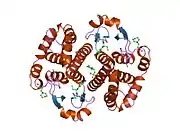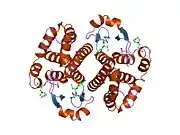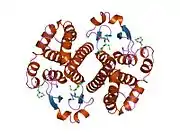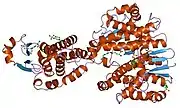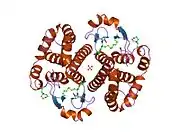GSTP1
Glutathione S-transferase P is an enzyme that in humans is encoded by the GSTP1 gene.[4][5]
Function
Glutathione S-transferases (GSTs) are a family of enzymes that play an important role in detoxification by catalyzing the conjugation of many hydrophobic and electrophilic compounds with reduced glutathione. Based on their biochemical, immunologic, and structural properties, the soluble GSTs are categorized into four main classes: alpha, mu, pi, and theta. The glutathione S-transferase pi gene (GSTP1) is a polymorphic gene encoding active, functionally different GSTP1 variant proteins that are thought to function in xenobiotic metabolism and play a role in susceptibility to cancer, and other diseases.[6]
Interactions
GSTP1 has been shown to interact with Fanconi anemia, complementation group C[7][8] and MAPK8.[9]
GST-Pi is expressed in many human tissues, particularly in the biliary tree, renal distal convoluted tubules and lungs.[10]
Possible drug target
Triple-negative breast cancer cells rely on glutathione-S-transferase Pi1, and inhibitors are being studied.[11] Piperlongumine has been found to silence the gene.[12]
References
- GRCh38: Ensembl release 89: ENSG00000084207 - Ensembl, May 2017
- "Human PubMed Reference:". National Center for Biotechnology Information, U.S. National Library of Medicine.
- "Mouse PubMed Reference:". National Center for Biotechnology Information, U.S. National Library of Medicine.
- Bora PS, Bora NS, Wu XL, Lange LG (October 1991). "Molecular cloning, sequencing, and expression of human myocardial fatty acid ethyl ester synthase-III cDNA". J. Biol. Chem. 266 (25): 16774–7. doi:10.1016/S0021-9258(18)55367-9. PMID 1885604.
- Smith CM, Bora PS, Bora NS, Jones C, Gerhard DS (November 1995). "Genetic and radiation-reduced somatic cell hybrid sublocalization of the human GSTP1 gene". Cytogenet. Cell Genet. 71 (3): 235–9. doi:10.1159/000134117. PMID 7587384.
- "Entrez Gene: GSTP1 glutathione S-transferase pi".
- Cumming RC, Lightfoot J, Beard K, Youssoufian H, O'Brien PJ, Buchwald M (July 2001). "Fanconi anemia group C protein prevents apoptosis in hematopoietic cells through redox regulation of GSTP1". Nat. Med. 7 (7): 814–20. doi:10.1038/89937. PMID 11433346. S2CID 35177844.
- Reuter TY, Medhurst AL, Waisfisz Q, Zhi Y, Herterich S, Hoehn H, Gross HJ, Joenje H, Hoatlin ME, Mathew CG, Huber PA (October 2003). "Yeast two-hybrid screens imply involvement of Fanconi anemia proteins in transcription regulation, cell signaling, oxidative metabolism, and cellular transport". Exp. Cell Res. 289 (2): 211–21. doi:10.1016/S0014-4827(03)00261-1. PMID 14499622.
- Wang T, Arifoglu P, Ronai Z, Tew KD (15 June 2001). "Glutathione S-transferase P1-1 (GSTP1-1) inhibits c-Jun N-terminal kinase (JNK1) signaling through interaction with the C terminus". J. Biol. Chem. 276 (24): 20999–1003. doi:10.1074/jbc.M101355200. PMID 11279197.
- Terrier, P; Townsend, AJ; Coindre, JM; Triche, TJ; Cowan, KH (October 1990). "An immunohistochemical study of pi class glutathione S-transferase expression in normal human tissue". The American Journal of Pathology. 137 (4): 845–53. PMC 1877535. PMID 1977319.
- Triple-negative breast cancer target is found. May 2016
- "Researchers uncover mechanism for cancer-killing properties of pepper plant".
Further reading
- Strange RC, Fryer AA (1999). "The glutathione S-transferases: influence of polymorphism on cancer susceptibility". IARC Sci. Publ. (148): 231–49. PMID 10493261.
- Kellen E, Hemelt M, Broberg K, Golka K, Kristensen VN, Hung RJ, Matullo G, Mittal RD, Porru S, Povey A, Schulz WA, Shen J, Buntinx F, Zeegers MP, Taioli E (2007). "Pooled analysis and meta-analysis of the glutathione S-transferase P1 Ile 105Val polymorphism and bladder cancer: a HuGE-GSEC review". Am. J. Epidemiol. 165 (11): 1221–30. doi:10.1093/aje/kwm003. PMID 17404387.
- Sekine I, Minna JD, Nishio K, Tamura T, Saijo N (2006). "A literature review of molecular markers predictive of clinical response to cytotoxic chemotherapy in patients with lung cancer". J Thorac Oncol. 1 (1): 31–7. doi:10.1097/01243894-200601000-00008. PMID 17409824.
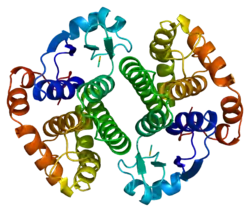


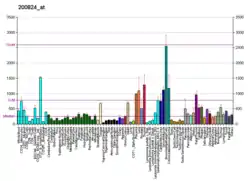
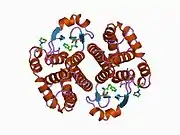
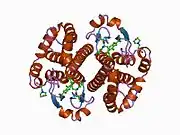
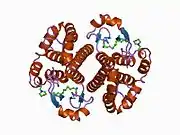
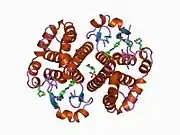
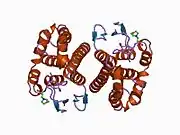
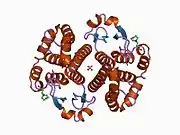
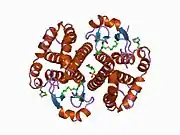
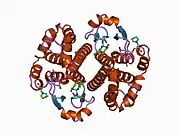
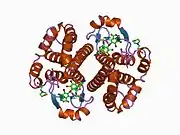
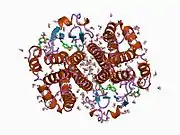
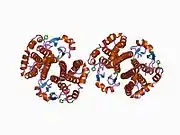
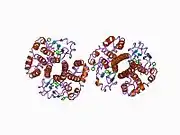
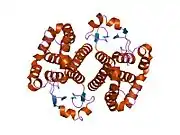
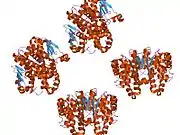
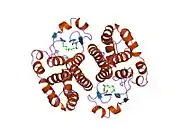
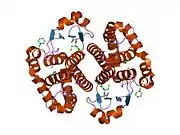
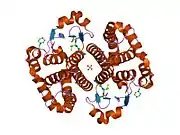
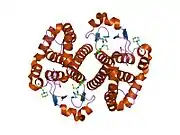
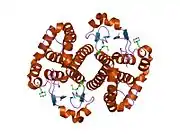
![1pgt: CRYSTAL STRUCTURE OF HUMAN GLUTATHIONE S-TRANSFERASE P1-1[V104] COMPLEXED WITH S-HEXYLGLUTATHIONE](../I/PDB_1pgt_EBI.jpg.webp)
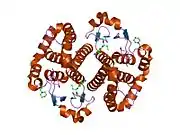
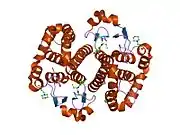
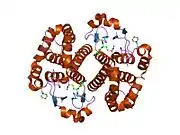
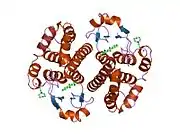
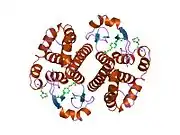
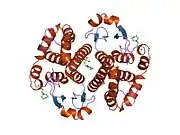
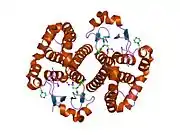
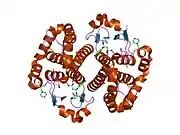
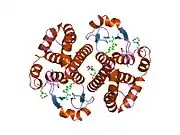
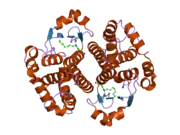
![2pgt: CRYSTAL STRUCTURE OF HUMAN GLUTATHIONE S-TRANSFERASE P1-1[V104] COMPLEXED WITH (9R,10R)-9-(S-GLUTATHIONYL)-10-HYDROXY-9,10-DIHYDROPHENANTHRENE](../I/PDB_2pgt_EBI.jpg.webp)
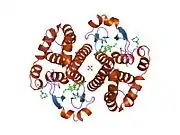
![3pgt: CRYSTAL STRUCTURE OF HGSTP1-1[I104] COMPLEXED WITH THE GSH CONJUGATE OF (+)-ANTI-BPDE](../I/PDB_3pgt_EBI.jpg.webp)
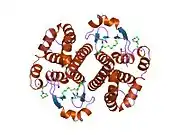
![4pgt: CRYSTAL STRUCTURE OF HGSTP1-1[V104] COMPLEXED WITH THE GSH CONJUGATE OF (+)-ANTI-BPDE](../I/PDB_4pgt_EBI.jpg.webp)
